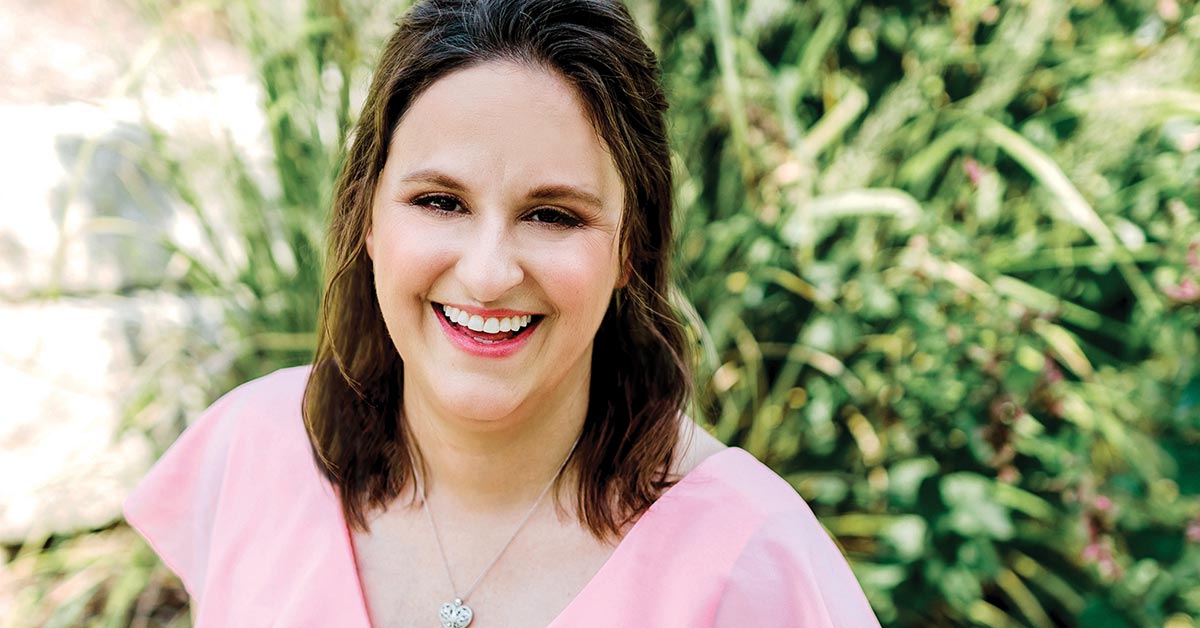Most 36-year-olds are thinking about further advancing their careers, planning their next family gathering, sharing a funny story with friends at an upcoming social outing or setting goals for the year ahead. The last thing they're pondering is being diagnosed with breast cancer. Yet in February of 2022, that was the reality for Kim May, when she'd received word that a mammogram and subsequent biopsy revealed Invasive Ductal Carcinoma, which accounts for about 80% of all breast cancer cases in women and people assigned female at birth.
May, a mother of four girls and nurse who lives in Mears near Silver Lake, knew something was wrong after a persistent and intense pain in her left breast. The diagnosis "hit her like a ton of bricks" and was her greatest fear come true.
"The hardest part is sitting awake when everybody goes to bed because your mind is racing," May recalled of the early days of her diagnosis. "I have four kids. I want to be here. I want to watch them on their wedding days and see everything that's to come."
Genetic testing revealed May had the BRCA2 genetic mutation, which also meant an increased chance of developing other cancers such as ovarian cancer. The following 10 months were an intense blur, with May undergoing multiple surgeries including a double mastectomy and hysterectomy, along with 16 rounds of chemotherapy and 25 rounds of radiation. She concluded oral chemotherapy in January 2024.
Support was a group effort and came in strong from May's family, friends and colleagues, whether it was a cooked meal, shoulder to cry on or simply a text checking in. She emphasized the mental toll the cancer experience takes on all involved.
"A lot of people forget that cancer affects not only the person diagnosed, but their entire family, too."
May shares that her husband Andrew was essential in her journey, ensuring she never went to a chemo session alone.
"During my recovery, Andrew cared for all four of our girls, cooked dinner, cleaned ... everything," she shared. "He also reached out to the American Cancer Society and found their 'Making Strides of West Michigan' walk. And though he didn't tell me at first, he signed us up and reached out to everyone we knew asking them to walk in my honor. A number of my coworkers still fly in each year to walk it alongside me. He named the team 'We Fight Together,' because that's exactly what we do."
Support for May also comes from meeting several women through and from the American Cancer Society, through which May and her husband have become ambassadors and speakers, sharing their story with others in the community to spread awareness and encourage action.
Though her cancer journey has included countless peaks and valleys, May credits her many nurses and doctors—including breast surgeon Dr. Jamie Caughran—as the reason she was able to get through her many procedures, appointments and surgeries with confidence.
Today, May is on year two of being cancer-free and feels like she's "finally getting back to normal," though she continues to live with pain from the experience. While she's keenly aware of the chance of recurrence, she remains steadfast in her faith, taking each day one step at a time and choosing to be optimistic for what the future holds. Her daughters—Dakota, Avery, Corah and Zoey—are the drivers of her passion to share her experience with others and influence advancements in eliminating breast cancer.
"I'd love to see a cure one day, especially when I think of my daughters," said May, who's also an advocate for starting mammograms at a younger age, as the rate of breast cancer in young women like herself continues to rise.
She encourages others to pay attention to their body, to fiercely advocate for themselves and to take action if your intuition is telling you something is wrong.
"Don't just sit there and think everything's OK, because it might not be," May said. "I hear lots of women who say, 'I don't need my mammogram. Why do we have to do this every year?' It might be scary, but guess what? You've got to do it."
Prior to her diagnosis, May was pursuing a second degree in healthcare administration—a pursuit that had to be put on pause while she sought treatment. Eventually, she got right back to it and will earn that degree in December 2024.
"When I say I'm going to do something, I do it," she said, sharing lessons learned from her journey and wisdom for others who may be facing a similar situation. "Don't give up. Appreciate the little things. A lot of people shut down and don't want to talk about it, because they think if they don't talk about it, then it's not real. Talking about my feelings and experiences are what really helped me get through it."
May grew up as a competitive gymnast and today finds joy in coaching her daughter's gymnastics and cheerleading teams when she's not working. Spending time with family is her ultimate place of solace and source of happiness.
"I used to be a worry-wart. My dad would always say, 'Worrying is like a rocking chair. It gives you something to do, but doesn't get you anywhere,'" May said. "But now, I try to live every day to the fullest; I don't dwell on what I can't control.
"Sharing my story is truly therapeutic. I'll talk to anyone who wants someone to talk to. If I can help even just one person in some way, then it's worth it to me."
May reminds us of the immense importance of following up on health screenings, doing monthly breast checks and having your voice heard.
"You never know when it could save your life, like it did mine."
According to the American Cancer Society:
- Breast cancer is the most common cancer diagnosed among women in the U.S.
- Approximately 1 in 8 women (13%) will be diagnosed with invasive breast cancer in her lifetime and 1 in 39 women (3%) will die from breast cancer.
- At every age, Black women are more likely to die from breast cancer than any other race or ethnic group.
- While rare, men can develop breast cancer and account for less than 1% of breast cancer cases in the U.S.
To learn more about breast cancer and to get involved with American Cancer Society's efforts, visit cancer.org.
Written by Sarah Suydam, Managing Editor for West Michigan Woman.
This article originally appeared in the Oct/Nov '24 issue of West Michigan Woman.
Photo courtesy of Kelly Braman Photography.




